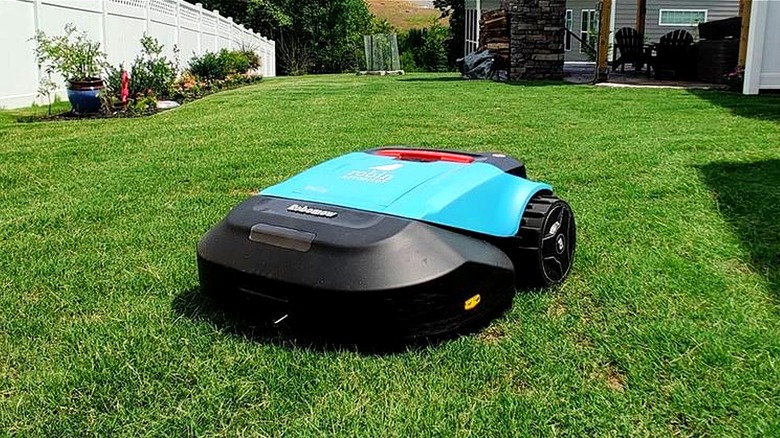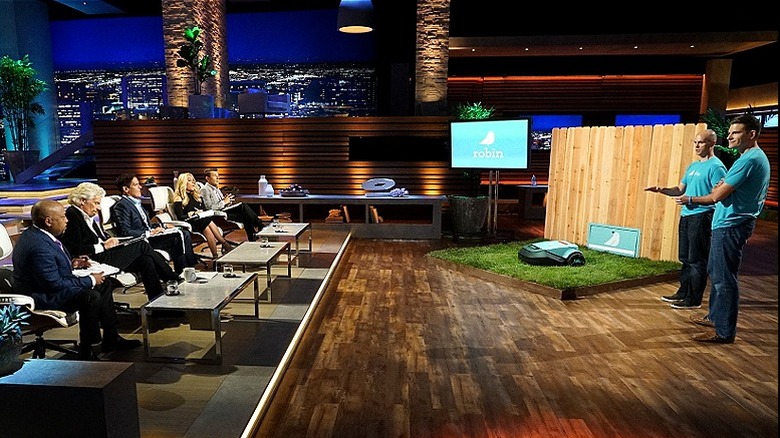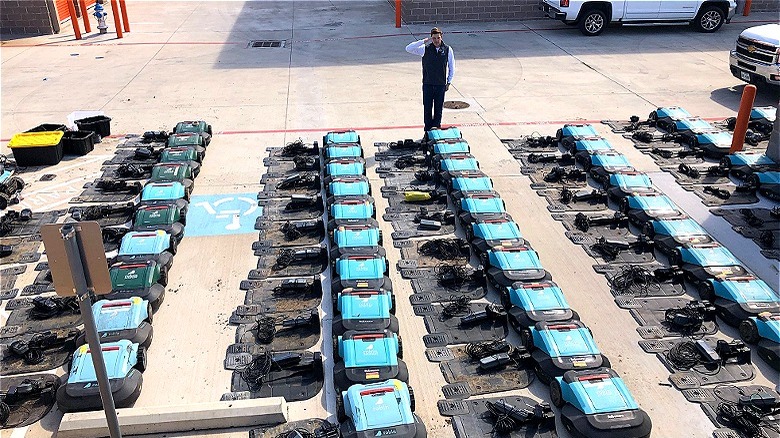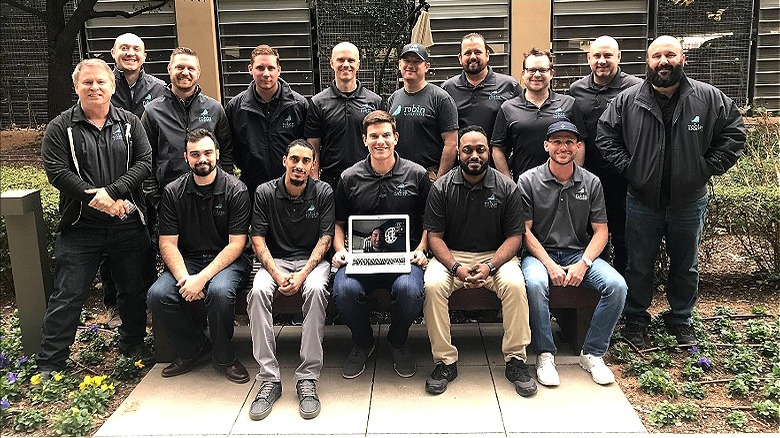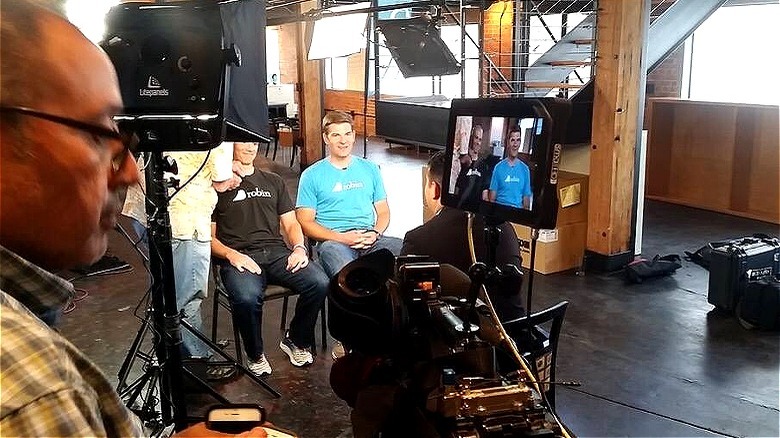Whatever Happened To Robin Autopilot Lawn Mowing Service After Shark Tank Season 9?
In a world where cars are self-driving, cell phones follow voice commands, and our refrigerators are arguably smarter than we are, why are we still mowing our lawns by hand? That's the question Justin Crandall and Bart Lomont from Dallas, Texas, sought to answer. Together in 2017, they founded Robin Autopilot, a service company that provides automatic, battery-powered lawnmowers that trim your grass a little bit at a time — almost like a Roomba for your yard. That same year, the founders brought Robin Autopilot to "Shark Tank" (Season 9, Episode 10), seeking help to expand their company and market the idea.
Robin Autopilot doesn't sell the actual autopilot mower; rather, the company rents out the mowers at a much lower cost of $17 per week. Once a wire boundary is installed around the yard, the mini-mower pilots itself within the boundary, similar to an invisible dog fence. When finished, it parks itself back at the charging dock until it's time to mow again. In addition to its standard rentable robot lawn mower, Robin Autopilot also offers optional edging and trimming done by human crews.
Founders Crandall and Lomont argue that Robin's robotic mowers are better for the environment because they depend on electric energy, unlike a traditional gas-powered mower. While their robot fleet may have been good at cutting grass, would Crandall and Lomont be able to cut a deal with the Sharks? Here's what happened to Robin Autopilot on "Shark Tank" and the company's growth after the episode.
What happened to Robin Autopilot on Shark Tank?
Bart Lomont and Justin Crandall sought a whopping $500,000 for a 5% share of their company, Robin Autopilot. The duo explained that they had years of experience running the business like an "Uber for lawn care," which pulled in almost $5 million annually. They wanted the Sharks' help to convert their traditional lawn care customers into robotic customers, essentially renting out the service of the robots.
Lori Greiner believed people would sooner buy their own robot before she could see any return on her investment. Mark Cuban agreed that the investment seemed like a very long-term gamble that required a lot of funds. Guest Shark Sir Richard Branson, meanwhile, didn't like the $10 million company valuation and declared he was out, too. Despite all the money the founders were pouring back into their company, Robert Hajervac didn't think it would catch on. Daymond John had plenty of praise to offer the Robin Autopilot founders, thanking Lomont for his military service once more. However, he had to admit that he was "outside the fence" on this one.
Lomont and Crandall walked out of the Tank without securing a deal from any of the Sharks. "It's a billion-dollar market in Europe. It will be a billion-dollar market in the U.S. with us driving it," said Crandall. Lomont agreed, "Two or three years from now, they're going to say, 'Dang! Why did I pass on Robin?'"
Robin Autopilot after the episode
Were they right? Did the Sharks of "Shark Tank" miss out on a great investment? While they weren't able to get a deal from any Sharks, Bart Lomont and Justin Crandall were still able to take their business to the next level. Since appearing on the episode, Robin's company structure has changed dramatically, expanding its fleet of robotic mowers and discontinuing its traditional, human-powered services. Robin Autopilot gained investors from MTD Products, a mass manufacturer of outdoor power equipment.
At some point, Robin Autopilot shifted its focus from selling directly to homeowners to selling to lawn care service providers. Essentially, it wanted to market robotics as a service (RaaS) to other companies. With the extra support from MTD Products, Lomont and Crandall were able to expand the business across multiple franchises. "Hard to believe we've already grown to 11 franchises in 8 months...or that this will be the SMALLEST group we'll ever have again," the company wrote on Facebook in 2019. "Thank you to all our franchise owners for believing in us and committing to this venture with us."
Is Robin still in business?
Yes, Robin Autopilot is still in business, but the answer is not so simple. Since first appearing on "Shark Tank" in 2017, Robin Autopilot has had quite the transformation, merging and partnering with several other lawn care-focused companies. By July of 2019, Robin Autopilot had been acquired by Fahey Group, an Ohio-based holdings company that promptly moved Robin's headquarters to Cleveland, Ohio. Fahey Group founder Logan Fahey took over the CEO position at Robin Autopilot, keeping Bart Lomont and Justin Crandall on the team as advisers. "We're positioning Robin to be the global leader in robotics deployment," said Fahey, who believed the robotic lawn care market would experience a major boom within the next few years (via The Dallas Morning News).
After being acquired by Fahey Group, Robin eventually acquired Mowbot (in 2021) and expanded a partnership with the Husqvarna Group, a lawn and garden maintenance investment group from Sweden. It also rebranded to Robin Technologies, a more suitable name for its business goals. At the start of 2023, the Fahey Group announced Robin was going to concentrate on expanding its business in Texas (dealerships) and California (technology).
What's next for Robin's founders?
With consumers becoming increasingly eco-conscious, Robin may have jumped into the game at exactly the right time. Given the success of robotic lawn care practices in Europe, a market forecast to reach $1.25 billion by 2027 (per ResearchAndMarket.com), it seems reasonable to think it's only a matter of time before autonomous, gas-free mowers take hold in the United States as well. Plus, who wouldn't rather spend their Sundays relaxing indoors with their A/C beating the summer heat instead of outdoors pushing a mower? While Robin Autopilot may have fizzled out as a distinct company, its ideas live on through the Mowbot and Robin Technologies partnership, and its robotic mowers continue to alter the landscape of home automation as we know it.
As for the founders, Bart Lomont and Justin Crandall, it seems both have taken a back seat after all their hard work jumpstarting Robin. Lomont remains a member of the Advisory board at Mowbot, but Crandall is no longer listed as a board member on the company's website. Both former founders still seem passionate about helping other businesses invest and grow, and Mowbot remains dedicated to helping the world become a cleaner, greener place one robot at a time.
